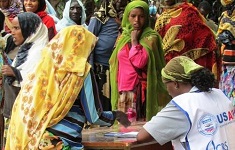The World Bank and the Government of Ethiopia inked this morning a $512.5 million loan and grant agreement, which aims to enhance productive safety net program of the later.
Of the total $200 million is loan from the World Bank to Ethiopia while the remaining is provided as grant. The agreement signed by Ahmed Shide, Minister of Finance of Ethiopia, and Ousmane Dione, World Bank Country Director for Eastern and Southern Africa.
The east African country will use the money for its productive safety net program (PSNP) and aims to enhance the implementation of Strengthen Ethiopia’s Adaptive Safety Net Project (SEASN). Currently, several millions people in Ethiopia re under productive safety net program, which provides food for the very poor living in both rural and urban areas.
Ethiopia’s Productive Safety Net Program (PSNP) is one of the largest social protection schemes in sub-Saharan Africa and has been implemented since 2005. In the ongoing fourth phase, which began in 2015, all regions of Ethiopia, except Gambella and Benishangul Gumz, are covered by the program and the number of beneficiaries has increased to around 8 million people.
Meanwhile, a new study published by four scholars in 2020 shows that PSNP had no and has no impact on household food security, child dietary diversity and child anthropometry. The study, ‘Impact of Ethiopia’s productive safety net program on household food security and child nutrition: A marginal structural modeling approach’, argues that Integrating PSNP with nutrition-sensitive programs may elevate its impact beyond meal frequency.
The study is conducted by –
- Bezawit AdugnaBahru, Chair of Rural Development Theory and Policy, University of Hohenheim, Stuttgart, Germany;
- Mulusew G.Jebena, Department of Agriculture Economics, Agribusiness and Rural Development, Jimma University, Jimma, Ethiopia;
- ReginaBirner, Department of Epidemiology, Jimma University, Jimma, Ethiopia; and
- ManfredZelle, Chair of Social and Institutional Change in Agricultural Development, University of Hohenheim, Stuttgart, Germany

